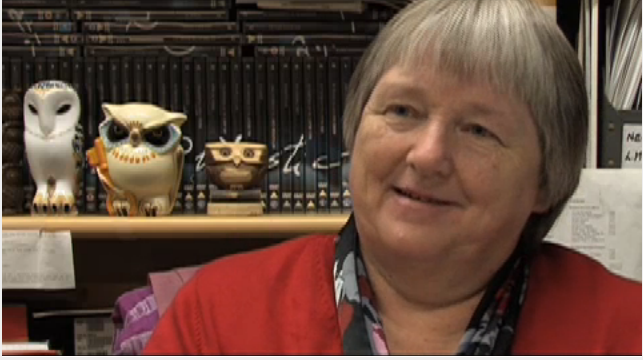Sinéad Loftus | Contributing Writer
Most students will remember, at their library lecture, a silver-coiffed woman with a toy owl under her arm marching up to the podium. This tradition will end as Ruth Potterton, more affectionately known as the ‘Owl Lady’, has retired recently after forty years of service as a college librarian.
Ruth came to Trinity doing General Studies in 1967. She worked as a student shelver and by third year, she owned her own set of keys to the library. After graduating in May 1971, she returned to Trinity to continue as a member of the Readers’ Service. When asked why she stayed, she explained, “for those who have worked in Readers’ Services for a long time, it’s all about the people”. Ruth soon inherited the job of mentoring student shelvers and graduate trainees who quickly became lifelong friends. She has been President of DU Ladies Hockey Club for more than two decades. Also, she is involved with Old Alex and since she has retired from the library, she is registry secretary for the Leinster branch.
The owl collection began in 1992 when Ruth made her first pilgrimage on the Camino de Santiago with MS Ireland, a journey she has made every year since. “I considered it a once off,” she said, “when I thought of Spain, I thought of beaches but North Spain was different. The landscape is stupendous.” It was there that she noticed small owl figurines and bought a few. In the following years, a few became many. “It just mushroomed from there,” she explained, “people started buying me owls. Professor of Sociology, John Jackson, collected hippos and he encouraged me to buy more owls. I bought him hippos and he bought me owls. It grew from that.”
The owls created an approachable image: “When I moved into the front office, they wanted a presence and the owls created that. The door was always open and students trounced in and out. I think the owls made me more approachable, hopefully students would think ‘she can’t be a total ogre’. First years don’t want to appear to be foolish by asking a question in their library class so I would hope that when they’d see the owls, they would remember me.”
Does she have a favourite? “I have owls from all over the world,” Ruth explained, “beautiful Spanish ones, one made of cork from Panama, another made of shells that was a gift from Thailand from a student. MS Ireland presented me with a stone one in Santiago. Great fun getting it home!” One of her utmost favourites is a clay owl that was made by a class in a rehab centre where a student from Social Studies worked. Ruth added that she even allowed staff members to keep an owl upon her retirement and fondly mentioned that the Phil borrowed an owl for their Freshers’ stand. “You have to be human,” she said, “they’re a bit of fun. There were always two owls in my office that were filled with chocolate bars which people ate, whenever shelvers were having a bad day. It’s about the students and the staff and I’d rather do things that they wanted and to heck with the rules and regulations.”
On the topic of the library, Ruth discussed how much an effect staff cutbacks and automated issues has had. “Staff used to know the students’ names but that’s not the case anymore. It also saddens me to hear lecturers saying, ‘you need to read this, it’s up on Blackboard’. To me, university was about browsing and reading around the subject.” She also discussed the wealth of material that Trinity has. It not only holds books and manuscripts but other famous items such as Daniel O’Connell’s hat, J.M. Synge’s typewriter and one of Oscar Wilde’s desks. “We need to sell those aspects a bit more,” Ruth said, “Cases full of books turn people away. Objects, books with intricate pictures are what people want. Not everything we have is out there, we have four million other items and hopefully they will attract more people to study here. There is so much more beyond the doors of the Lecky.”
There’s no denying what Ruth will miss the most. “Definitely the people,” she said, explaining how she enjoyed helping students to think outside the box. “If a student had a project and were struggling, I would ask them if they had checked the newspaper, the archive is there.” One of her most rewarding times in Trinity was when she answered the some 8,000 emails that reached the Duty Librarian every year. “It’s about going that extra mile for someone when you don’t have to”. The queries ranged from Latin Primer keys to books on paddle steamers and the history of soda bread. “When in doubt, ask Trinity Library!” she said, “They just might have it!”
Finally, I asked Ruth if she had advice on the Camino for students. “Give yourself time,” she advised, “it’s not a race. You meet people who walk 40km everyday and wonder why they keel over after six days and have seen nothing.” She said to try some of the quieter routes. “Smell the flowers and talk to the locals. They are so proud of it and want to share it with people. There’s a huge sense of community. It has been commercialised, of course, but to the elderly in the villages, it’s important”.







